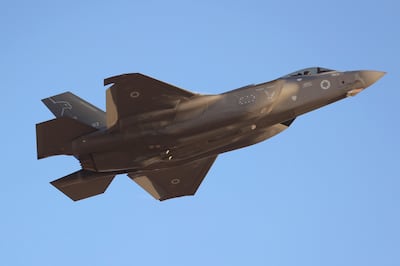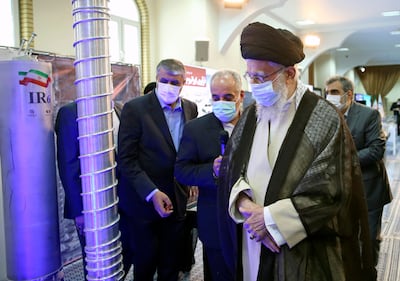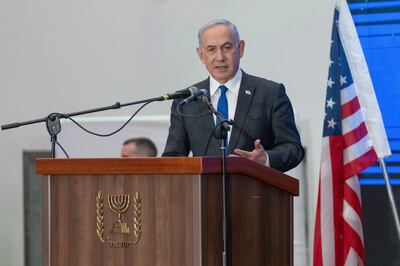Live updates: Follow the latest on Israel-Gaza
Israel’s air force cannot halt Iran’s nuclear programme with a military campaign because it lacks bombs and aircraft with sufficient range, the country’s former prime minister has told The National.
“Israel has no means to be able to destroy the nuclear programme of Iran,” Ehud Olmert said in an interview.
He called on his successor Benjamin Netanyahu to stop the Gaza campaign and make a deal with Hamas to get the 102 remaining Israeli hostages home.
Israel’s prime minister from 2006 to 2009 also suggested the government could be faced with a “major setback” if it did not progress with the peace process, as tensions between Israelis and Palestinians increase.

Nuclear Iran
Iran is understood to have enriched its uranium to 60 per cent, close to the 90 per cent required to make a nuclear bomb.
For many years Israel has threatened to destroy the Tehran regime’s nuclear facilities if they reached weapons grade.
But Mr Olmert, 78, told The National “this is not an option”, as the Israeli air force lacks the ability to penetrate the 60-metre mountain bunkers sheltering the nuclear plants.
“We can destroy their headquarters, important projects, railways, roads and airports,” said Mr Olmert. “Israel can do a lot to damage Iran's infrastructure but Israel has no means to be able to destroy the nuclear programme of Iran.”

Its advanced F-35A stealth aircraft, which have a maximum range of 2,200km, are unable to fly to Tehran and back again because Israel does not have sufficient in-flight refuelling tankers.
“Nuclear facilities are 50 or 60 metres underground, which makes it almost immune to any military attack from the above,” the former prime minister said, speaking at his office in Tel Aviv.
“F-35s don’t have range to fly to Iran and back as we don’t have enough tankers.” While Iran's immediate border is 1,200km away, major military sites such as Bandar Abbas airbase are more than 2,000km away.
The Israeli air force does have seven of Boeing 707 tankers but the issue, according to defence analysts, is “scale” compared to, say, the US air force.
There is also said to be fuel drop-tank shortages for its large fleet of F-15 and F-16 fighter-bombers which suggest they would “struggle to hit Iran for a prolonged war”, a defence source said.
In response to Mr Olmert’s assertion, Lt Col Peter Lerner, a spokesman for Israel’s military, said: “We have full confidence in our capabilities to deal with all of the threats in the region.”

Hostages home
Having “destroyed a very major part of Hamas’s military capacity” in the Gaza campaign, Mr Olmert called for a ceasefire in return for hostages.
But Mr Netanyahu rejects this proposal because right-wingers in his coalition would be outraged at any deal with Hamas. “It is probably going to break up his government in 24 seconds, not 24 hours,” Mr Olmert said.
He accused the Prime Minister, who faces corruption charges, of being ready “to pay in national interest, including lives of hostages if not lives of soldiers, for his political and survivability”.
“He needs to be removed, there is no way that he can stay in power,” said Mr Olmert, who served a short jail term for corruption.
He condemned Mr Netanyahu’s pre-October 7 policy towards Gaza. “I would have never, ever flirted with Hamas at the expense of the Palestinian Authority, this is the basic fundamental error of policy of the highest historical proportions.”
He said if he had dealt with the Palestinian Authority, “there is only one item on the agenda and this is peace” and a two-state solution but “Netanyahu doesn't want to concede one centimetre of territory”.

Pompous rhetoric
The former leader, who developed a strong relationship with US president George W Bush during his premiership, authorised the 2006 operation into south Lebanon to remove Hezbollah from the northern Israeli border.
But without sustainable peace in the past two decades, and with significant Iranian support, extremists have been able to position their missiles and forces close to the border.
“Hezbollah started to understand that while the Israeli leadership was very pompous in its rhetoric, its delivery was very limited and constrained so they started to glide back into the southern border.”
While he did not suggest another invasion would be helpful, he did warn there was a possibility Hezbollah had tunnels dug for an infiltration into Israel.

Setback risk
The only way for Israel to prevent the deteriorating security situation was to negotiate with the Palestinians for a two-state solution, Mr Olmert said.
“There is an opportunity for major progress and there is a risk for a major setback,” he said. “And the question is whether we will be wise enough to understand that.”
But he warned there was a “very sophisticated manipulation” by right-wing forces against the peace process who were opposed to any concessions “at any cost”.







